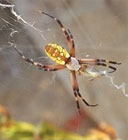

West
African Folk-Tales
by William H. Barker and Cecilia Sinclair
How
We Got the Name "Spider Tales"
How
Wisdom Became the Property of the Human Race
Why
the Lizard Moves His Head Up and Down
Tit
For Tat
Why
White Ants Always Harm Man's Property
Why We See Ants Carrying Bundles As Big As Themselves
Why Spiders Are Always Found in Corners of Ceilings
Anansi
and the Blind Fisherman
The
Grinding-Stone That Ground Flour By Itself
Why the Sea-turtle When Caught Beats Its Breast With Its Forelegs
How
Beasts and Serpents Came into the World
Why the Moon and the Stars Receive Their Light From the Sun
How
the Tortoise Got Its Shell
Why the Leopard Can Only Catch Prey On Its Left Side
King
Chameleon and the Animals
To Lose an Elephant For the Sake of a Wren Is a Very Foolish Thing To Do
Why Tigers Never Attack Men Unless They Are Provoked
Tit For Tat
THERE had been a great famine in the land for many months. Meat had become so scarce that only the rich chiefs had money enough to buy it. The poor people were starving. Anansi and his family were in a miserable state.
One day, Anansi's eldest son—Kweku Tsin—to his great joy, discovered a place in the forest where there were still many animals. Knowing his father's wicked ways, Kweku told him nothing of the matter. Anansi, however, speedily discovered that Kweku was returning loaded, day after day, to the village. There he was able to sell the meat at a good price to the hungry villagers. Anansi immediately wanted to know the secret—but his son wisely refused to tell him. The old man determined to find out by a trick.
Slipping into his son's room one night, when he was fast asleep, he cut a tiny hole in the corner of the bag which Kweku always carried into the forest. Anansi then put a quantity of ashes into the bag and replaced it where he had found it.
Next morning, as Kweku set out for the forest, he threw the bag, as usual, over his shoulder. Unknown to him, at each step, the ashes were sprinkled on the ground. Consequently, when Anansi set out an hour later he was easily able to follow his son by means of the trail of ashes. He, too, arrived at the animals' home in the forest, and found Kweku there before him. He immediately drove his son away, saying that, by the law of the land., the place belonged to him. Kweku saw how he had been tricked, and determined to have the meat back.
He accordingly went home—made a tiny image and hung little bells round its neck. He then tied a long thread to its head and returned toward the hunting-place.
When about half-way there, he hung the image to a branch of a tree in the path, and hid himself in the bushes near by—holding the other end of the thread in his hand.
The greedy father, in the meantime, had killed as many animals as he could find, being determined to become rich as speedily as possible. He then skinned them and prepared the flesh—to carry it to the neighbouring villages to sell. Taking the first load, he set off for his own village. Half-way there, he came to the place where the image hung in the way. Thinking this was one of the gods, he stopped. As he approached, the image began to shake its head vigorously at him. He felt that this meant that the gods were angry. To please them, he said to the image, "May I give you a little of this meat?" Again the image shook its head. "May I give you half of this meat?" he then inquired. The head shook once more. "Do you want the whole of this meat?" he shouted fiercely. This time the head nodded, as if the image were well pleased. "I will not give you all my meat," Anansi cried. At this the image shook in every limb as if in a terrible temper. Anansi was so frightened that he threw the whole load on the ground and ran away. As he ran, he called back, "To-morrow I shall go to Ekubon—you will not be able to take my meat from me there, you thief."
But Kweku had heard where his father intended to go next day—and set the image in his path as before. Again Anansi was obliged to leave his whole load—and again he called out the name of the place where he would go the following day.
The same thing occurred, day after day, till all the animals in the wood were killed. By this time, Kweku Tsin had become very rich—but his father Anansi was still very poor. He was obliged to go to Kweku's house every day for food.
When the famine was over, Kweku gave a great feast and invited the entire village. While all were gathered together, Kweku told the story of his father's cunning and how it had been overcome. This caused great merriment among the villagers. Anansi was so ashamed that he readily promised Kweku to refrain from his evil tricks for the future. This promise, however, he did not keep long.
The text came from:
Barker,
William H.
and Cecilia Sinclair. West African Folk-tales. Lagos, Africa: Bookshop, 1917.
Amazon.com:
Buy the book in paperback.
©Heidi
Anne Heiner, SurLaLune Fairy Tales
E-mail: surlalune@aol.com
Page last updated September 5, 2006
www.surlalunefairytales.com









